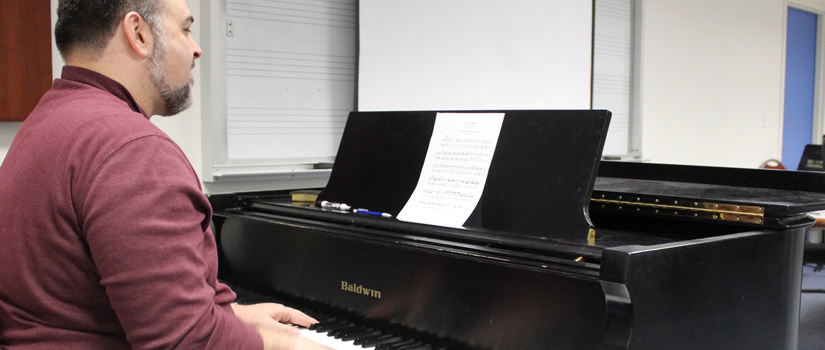The abrupt shift to online teaching during a global pandemic tested educators’ adaptability and flexibility. While certainly a challenging time, many rose to the occasion and made the best out of a stressful situation. This series, Teaching Online Success Stories, will highlight USC faculty who have excelled in online education. Each story will share their experiences, advice, and teaching strategies.
With face-to-face interaction strongly discouraged, how would one go about spreading the joy of music? This is a challenge J. Daniel Jenkins, associate professor of music theory, had to address swiftly. In the fall of 2020, Jenkins taught online for the first time in a graduate course called “Public Music Theory.” The main purpose of the course was to engage the public with music theoretical knowledge. The online structure of the class created a barrier to public and student engagement.
“Not only were we going to have difficulties engaging with the public, but we were going to have difficulties engaging with each other,” Jenkins said. “Because we didn’t have the opportunity to meet in person, this situation kind of went against the whole motivation for the course.”
Jenkins had to devise a plan that would allow students to collaborate with one another while also reaching a broader audience. This plan came to fruition in a project focused on music and memory with the Lourie Center, a recreation center for senior citizens in Columbia.
“As we age, memory is often an issue for people. Memory deterioration can be quite progressive, when dealing with illnesses like Alzheimer’s,” Jenkins said. “But there's been a lot of research that shows that the brain's ability to remember music is quite robust, that even people with advanced Alzheimer’s disease have musical memories.”
To encourage student engagement not only for the Lourie project but also in the virtual classroom, Jenkins found that students were more likely to have vibrant discussions in small groups and enjoyed reviewing their peers’ assignments. Students were divided into three groups: interviewers, analysts, and technology and production. The class worked together to create a 50-minute video and audio presentation of different musical arrangements and informational sessions.
“It wasn't the same as going to the Lourie Center, which is what we'd wanted to do. But we felt within the limitations of the online environment, we successfully made a connection with this community partner on an issue that's very important to them,” Jenkins said. “I was really excited to see how students reacted to the challenge and I was very proud of them.”
While teaching online can cause different problems to arise, Jenkins advises educators to have patience and flexibility. Both student and teacher are dealing with a difficult situation and must be willing to adjust to everchanging needs. Jenkins also found it helpful to turn to his peers for advice.
“The technology support staff at the School of Music created a team within Microsoft Teams so that faculty within the school could share things with each other things that were going well, and I think that helped out a lot,” Jenkins said.
In addition to the support received within the department, Jenkins sought guidance from the Center for Teaching Excellence. Jenkins participated in the Teaching Towards Inclusive Excellence (TTIE) certificate of completion program, a joint initiative with the Office of Diversity and Inclusion designed to strengthen strategic diversity leadership capacities in and outside of the classroom. Jenkins discovered the importance of retaining a human appeal in the virtual realm.
“At the base of issues around diversity, equity, and inclusion is seeing your students as human beings,” Jenkins said. “I had good interactions at those sessions, and it would just remind me that it's not about whether someone completed assignments and got good grades, but it's about remembering that there are humans on the other end of that computer screen.”
While being thrown into online teaching can be a stressful situation, finding ways to keep your students motivated and engaged is rewarding. To consult with a member of our instructional design team or learn more about our instructional design services, Schedule an Instructional Design Consultation.
